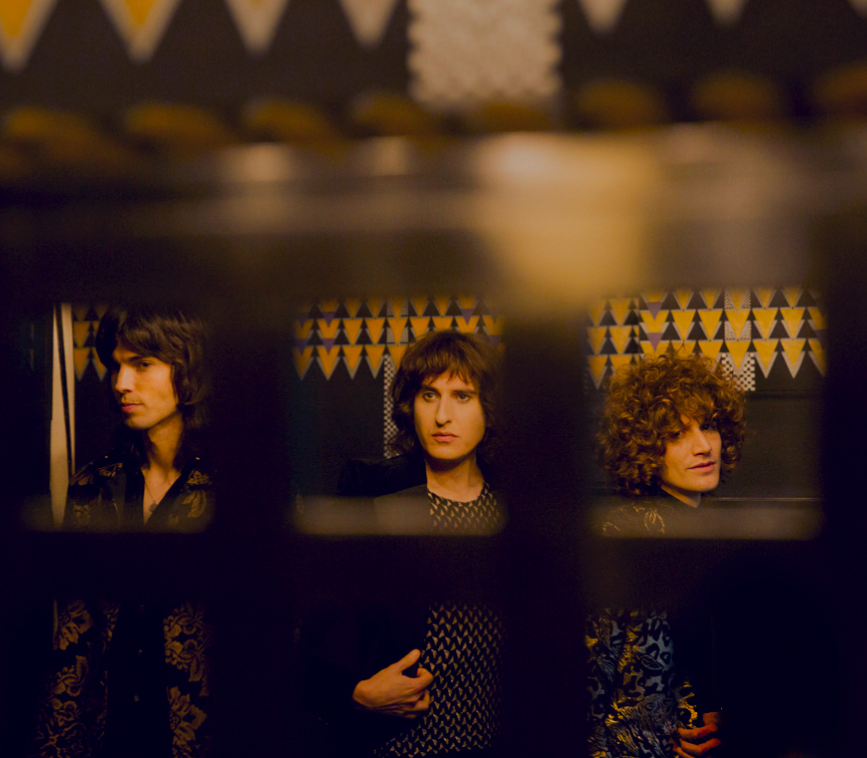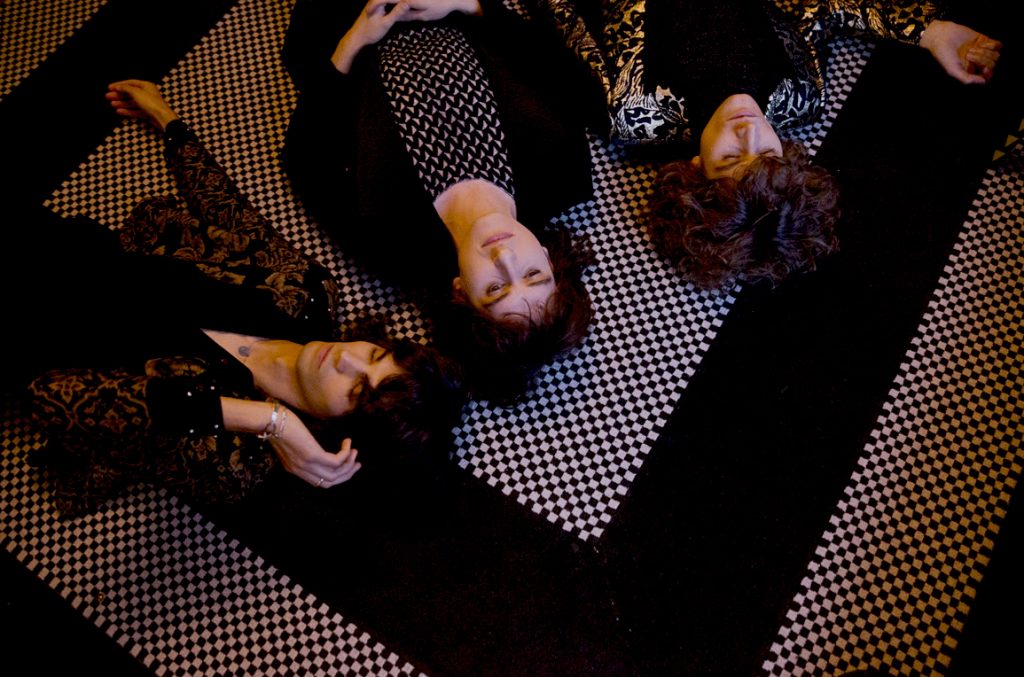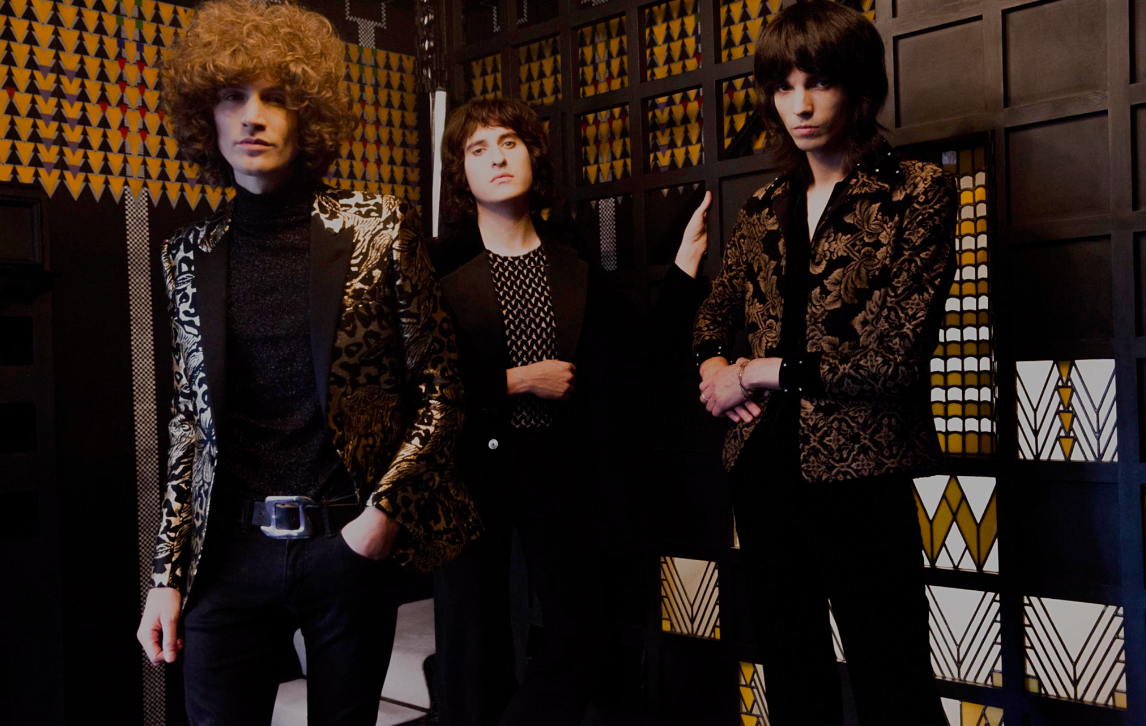All photos ©Laura A-F
Einige dachten, wir wären längst im 21. Jahrhundert gelandet und würden uns dieser Zeit voll und ganz hingeben. Aber dann warf die britische Band Temples vor fünf Jahren mit einem Schlag alles über den Haufen. Sun Structures hörte sich wie 1968 an. Psychedelischer Rock kreiste um die Beatles, Beach Boys, Kinks oder Zombies, die Melodien in „Shelter Song“, „The Golden Throne“ oder „Move With The Season“ saßen wie der Maßanzug und auf dem Cover zeigte uns die Band ein historisches Gebäude aus dem späten 16. Jahrhundert, das in der Nähe ihrer Heimatstadt Kettering unter Denkmalschutz steht. Mit dem Nachfolger Volcano rebellierten Temples mit überproduziertem, stärker elektronisch unterfüttertem Sound, der im Ergebnis etwas sehr an Tame Impala erinnerte.
Jetzt hat sich wieder einiges geändert. Einmal personell, Drummer Sam Toms hat die Band verlassen. Die Plattenfirma ist eine andere und musikalisch tarieren Sänger und Gitarrist James Bagshaw, Bassist Tom Walmsley und Keyboarder Adam Smith ihre Balance besser aus. Historisch bewanderte Spurenleser freuen sich über Hinweise auf The Troogs, Donovan oder Glam Rock. Dass man auch an aktueller Musik interessiert ist, zeigt der Hip-Hop-Beat in „You‘re Either On Something“. Rhythmisch, eingängig, erfinderisch – Temples sind generationsübergreifend gut gerüstet.
Zum Interview im sommerheißen Berlin erschien die Band in kompletter Kernbesetzung. Auf der Tour im November ist der neue feste Drummer Rens Ottink dabei. Er ist seit seiner Zeit in der niederländischen Psych-Band PAUW kein Unbekannter. Jetzt sorgt auch er dafür, dass auf dem dritten Temples-Album Hot Motion alles richtig schön hochkocht. Wie es dazu kam, sagen die Südengländer am besten selbst.

Since you‘ve already made three records, you certainly have an idea what it is like to work on an album from beginning to end. How would you sum up your recording process in general?
Tom: It always takes time with us, it‘s quite an intense process how we write and record. I don‘t know how we would fare if we blasted an album out in six weeks. We like to sit on ideas and let them develop slowly before we can call it an album.
James: For some songs we need minimal time to get core elements. ,Hot Motion‘ is one of those where we had the rhythm section and the melody. The bass makes the song exciting in my view, it took us just a few days to write it. There‘s no average on how it works because some songs need time to mature. There might be songs we didn‘t look at for maybe two months because we‘d finished other songs. Only later we knew and understood where one song sits on the album and where we need to make changes. After a period of reflection we have a fresh view.
Adam: This record is much more focused and stripped back in production and the way the arrangements are sitting. There aren‘t as many effects on here as on the one before.
Did you feel that after the first record you wanted to get away from the 60s-oriented vibe?
James: We wanted a different approach, but we didn‘t think that we can‘t make a sound like in the 60s anymore, let‘s get the synths out. You have to remember there are a lot of people that didn‘t like the first record because it was far too pastiche. For them it had nothing new or original about it. I guess we wanted to create something more contemporary. In doing so we pulled some of our character out of the songs because we were searching for the opposite of what was our instinct. The first record is basically just following instinct, the second one was fighting against the instinct for the sake of hopefully coming out with something that is better than anything we‘ve done before.
There have been people who championed your first album publicly. Noel Gallagher said that he wanted to hear this kind of music more often on the radio. Did you feel it‘s difficult to live up to such expectations, was it stifling?
Adam: We didn‘t have too much time to think about it at the start, we got put on tour straight away and it was heavy touring around the world. We got to see places we haven‘t seen before, doing US television which seemed so bizarre and surreal and it all went really, really fast. Then we stopped touring for two years, got back inside and started to write Volcano but I don‘t think it was stifling.
James: That second record thing is so weird, you can‘t explain it to anyone unless they have a first record that actually gets them out of their tower. There are only two ways you can go. You can either do the same record again and maintain many of the fans. Or you do something different. It‘s a weird thing because you want to do a follow-up but there‘s a certain level of expectation, so you don‘t want to do the first album again. Maybe there was pressure. I think the songs were there but it was hard to find a sound for the record. It definitely has a sound to it, it‘s a concise record, but it‘s great that we never have to make a second record again.
Can you please clear up why Sam Toms is not the drummer of the band anymore?
James: We had to have a conversation with him and let him go. In a band you need consistency, you need to be a gang of people that are looking out for each other, on a personal level but also musically. We‘re serious about the music that we make and when it comes to live performance we‘re all there to play the show and that‘s king. What happens after the show is absolutely fine but if it jeopardizes the show and what you do then, that‘s not cool. Too many years we had to put up with that, we had to make a decision.
A certain lack of discipline?
Tom: I think so. It‘s unconditional because we all grew up more or less together in the same place in Kettering, Northamptonshire and you think there‘s always that bond that will keep you together. But you have to play your part in the band and, as James said, if playing the shows is jeopardized then it compromises what we do.
Jeopardized in what way?
James: Not turning up?
Tom: That‘s the main one, yeah. We were unable to play as the four of us to a very large degree, it wasn‘t a nice feeling.
Well, he‘s now playing with Fat White Family who are known for their discipline. It can only work out perfectly…
(all laughing)
Adam: They will all be late at the same time which means that no one will be late. I think it‘s quite a cunning plan.
The drum patterns on this record are interesting. They often sound like they‘re coming from a dystopian marching band. In a statement given beforehand you‘ve described „The Howl“ as „a call to arms, with a rhythm section that stomps and marches onwards in honour of our ancient ancestors“. Are you targeting a historic sense of Britishness?
Tom: Yeah, a lot of it feeds from British history and sensibility and approach to storytelling and songwriting with the lyrics, the grandness of the records and the attention to melody. It‘s a strong part of what are doing. It‘s that British thing to not take yourself so seriously combined with an element of darker comedy.
Adam: It‘s never considered though. It‘s not like we‘re sitting down and thinking: Have we made the song more British? It‘s just inherent because we‘re British and we‘re fans of British music.
James: It‘s all in our DNA to be like that with anything whether it‘s comedy, nursery rhymes or playwrights who are all able to put tragedy and humour within one word almost. There‘s elements of that on the record. Yeah, it is a British record, but it‘s also representing the European people in us. It‘s not a Brexit record, it‘s not like: Britain First!
Did you vote in the referendum?
All: Yes.

Did you choose to remain in the EU?
Adam: The three of us and pretty much everybody our age that we know did.
Tom: Statistically the amount of people who have died and the amount of people who are now old enough to vote, would now bring a remain outcome.
Adam: Our hometown Kettering had one of the highest leave percentages.
Tom: So we‘re three remainers out on a limb (laughs).
What do you think about the fact that Alexander Boris de Pfeffel Johnson is going to be the next prime minister?
James: It‘s exciting to see the demise carry on (laughs). As long as the Tories are in power, they‘ve got nothing in common with us. It‘s doesn‘t really matter who it is, as long as they don‘t bring in some crazy stuff that alienates people even more. The people that need the help in our country couldn‘t care less who the prime minister is because none of those people are good options for us. It‘s laughable really. Boris is like a buffoon, he‘s a cartoon character, he‘s not a leader of a country.
„Atomise“ could be seen as a warning that we have to take care of the environment in order to survive as a species. Do you feel you have to state there‘s danger and we have to do something?
Tom: Yes, absolutely. It‘s more the spiritual connection with what surrounds you, fearing nature on the one hand and it being what you ultimately want to connect with. But doesn‘t it make you more fearful when it‘s 40°C in Berlin in June, the ice caps are melting and it will be a drowned world soon? We need to look after Mother Earth.
Especially when you‘re coming from an island….
All: YES!
Adam: People forget that Britain‘s such a small island and we are like a little island race, arent‘t we? Little weird island people really. If Mother Nature brings us a tsunami or something, we will be buggered.
Let‘s turn to something lighter. Simon Reynolds has recently published a book called Shock And Awe about glam rock and its legacy. It‘s fair to say you‘re showing a similar interest in songs such as „The Beam“ and „Step Down“. How does the beauty of that genre hit you as a band?
Tom: Yeah, I‘ve got the book and have read half of it so far. I think it takes, to quote Reynolds, the idea of the icon in music from the 1950s and putting it through the weird oddity processor that is the 70s that brings out all these interesting unhinged extra facets to the music.
James: There‘s something sleazy about the glam rock thing too. We wouldn‘t want to be a pastiche of that in being hair glam or whatever you want to to call it (laughs). It‘s a bit sleazy and I guess British with that sort of androgyny. At the same time the music isn‘t that weird apart from the approach of the recording of it. Like Tom said, the 50s song sensibility which is essentially a few chords and a melody that is happy and melancholic and maybe a little nursery-rhyme-like. But then you‘re throwing in these razorblade guitars that sound like they‘re going through a blender or something on a grate. It‘s very harsh, glam rock has got this thing where‘s it‘s very to the point and direct and fearless, it doesn‘t sound like anyone‘s hiding in those songs. We play around with the idea on probably most of the music that we make on certain songs because it‘s something that appeals to us. It‘s part of the musical palette.
Tom: But you have to have more than just an ear for the sound. Take Bowie or Bolan as examples. If you don‘t have the mystery and the charm that it requires then you‘re just left with something that‘s quite superficial and fairly disposable, it has no longevity. Hopefully people understand we‘re trying to go deeper with it as a group.











